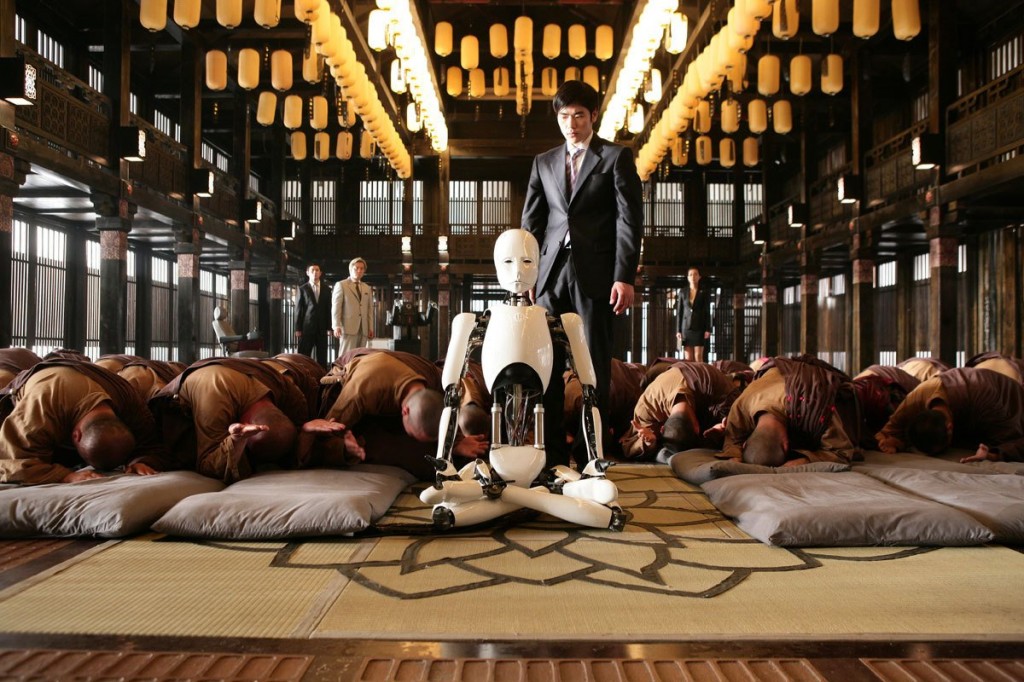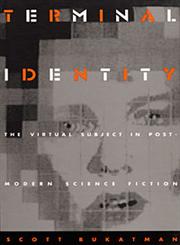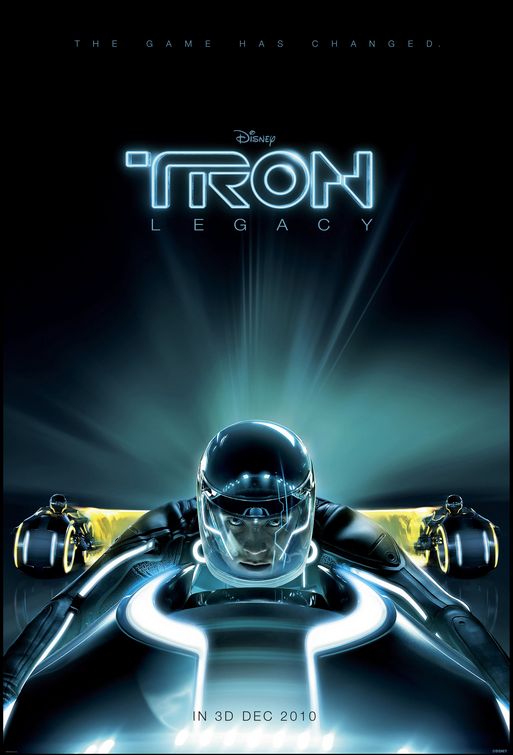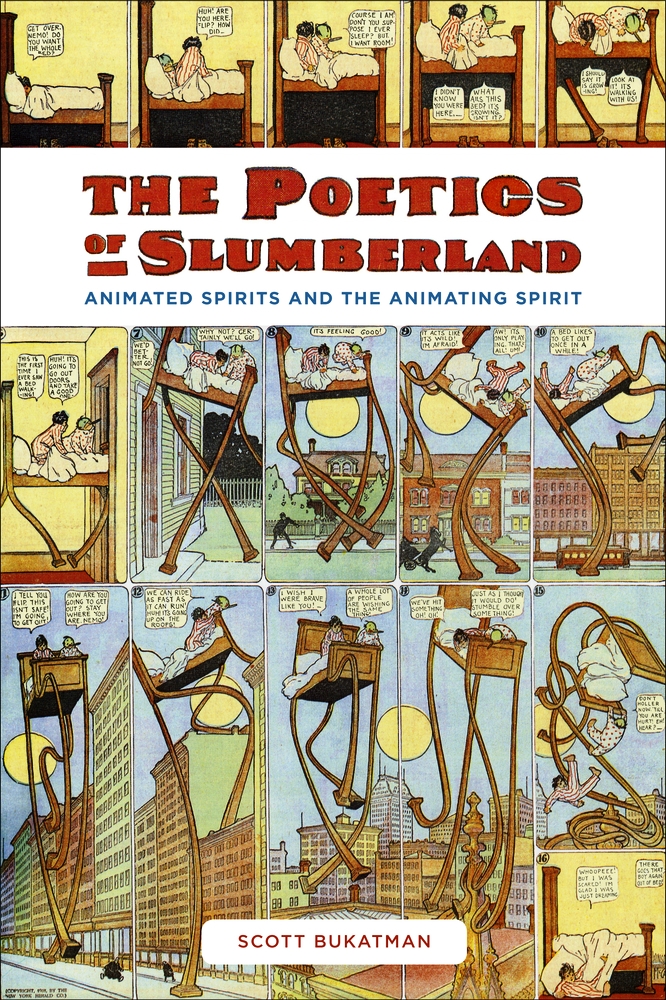By Haerin Shin and Angela Becerra Vidergar
Editor’s note: This is part one of an interview with Stanford professor and author Scott Bukatman.
Four months have gone by since what I’d call Korea’s first “cyberpunk”(-ish) film, Doomsday Book (인류멸망보고서), was released and qui etly faded out of the theaters. Given that this piece had more of an indi-touch to it rather than going for Hollywood-level special effects we see in typical epidemic or astronomical apocalypse/AI or robot blockbusters, its modest performance was somewhat expected. But again, its rather quiet entry into and disappearance from the public’s notion, despite the unprecedentedness of its formula (whether or not you like what you see totally depends on individual taste–I give you that– but seriously, this is the first perfect apocalypse triathlon – zombies, sentient robots, and meteors– in Korean film history!!) leaves us with some food for thought.
etly faded out of the theaters. Given that this piece had more of an indi-touch to it rather than going for Hollywood-level special effects we see in typical epidemic or astronomical apocalypse/AI or robot blockbusters, its modest performance was somewhat expected. But again, its rather quiet entry into and disappearance from the public’s notion, despite the unprecedentedness of its formula (whether or not you like what you see totally depends on individual taste–I give you that– but seriously, this is the first perfect apocalypse triathlon – zombies, sentient robots, and meteors– in Korean film history!!) leaves us with some food for thought.
Let’s start with the presence and reception of science fiction in Korea. Upon reflection, we notice that our self-assured pride in Korea’s status as the newly risen IT capital, interestingly, has never really seeped into the realm of narrative representation, which not only represents, but also reflects on and inspires the tangible reality we live in. Not to say that stark realism dominates the scene; we have witnessed an inundation of “fantasy” fiction in the publishing market since the advent of Lee Young-do’s Dragon Raza, martial art novels that fuse old-school oriental adventure with supernatural features abound, and games that boast an international following in similar veins (i.e. Lineage) hold a firm grasp on the growing game sector. But again, the above examples all fall under the category of “fantasy” rather than “science fiction.” One might ask, so what’s so different about the two? Feed the dragon a time-warp engine, teach the knights how to play around with computers and give the superheroes steel limbs or plug their brains into the net, and we have the SF equivalent of the fantasy formula: spaceships, hackers and robots. Well? What now?
Cyberpunk, steampunk, medical/genetic thrillers, space operas and so on; let’s not get lost into the maze of sub-genres and all the hairsplitting details. The crucial difference between fantasy and science fiction lies in the gap between the possible and the probable. Let’s put it this way – SF is about technology. What we the people, supposedly, “could” or “could have” done given the right resources and knowledge, preferably within a rationally conceivable sphere of thoughts, behaviors and phenomena. Perhaps not so much in each and every case, but in general, that’s what we get in science fiction. I’m not saying the things we read and see in this genre are all realizable technology, but the important point here is that the cognitive chasm between “envisioning a fictional reality where the improbable is MADE probable” and “conjuring up a new world where the impossible IS simply possible” (because, by definition, what is impossible cannot be made possible) illuminates a fundamental difference in world view. Both processes are empowering and liberating (we get to vicariously experience stuff we currently don’t or will never be able to here and now, i.e. growing wings and roaming the sky or weaving through the skyscrapers in a flying car), but the question is: who/what liberates and empowers whom/what? The great force of incomprehensible Nature? A different set of laws of physics? Or people, or even other species/things, those that can be identified as and identified with as subjects?
Nothing wrong with either option. But let’s remember that we now live in an age where the degree or width of reliance on technology – ranging from phones, computers and the bigger guys such as cars and planes – not only conditions, practically defines our lives, and who we are. I’m not talking to hermits living in the deep folds of the mountains here; I’m conversing with you, reading this piece either on your computer or smartphone screen. In almost every conscious moment of our lives, we ceaselessly dilute and compile ourselves through the technological extensions surrounding us. I’m physically here but my voice is at the other end of the city talking to my friend. There’s one “me” but I wear countless different, fluid faces through Facebook, Cyworld, and all those blogs that represent and constitute me. Simply put, in the age of technological self-extension and multiplication/diversification, we have even more roles to play and fulfill than ever, which presents us with more potential to make and do new stuff but also more responsibilities than we’ve ever had to shoulder. We live in a world where the process of being is visibly and increasingly not only an individual but also collective and interactive making of a phenomenal scale, and to make, there’s a need to (if not know at least) think about what goes on behind the scene, and what/who makes us while we make ourselves and in turn the world we live in.
Walk down the busiest streets in Seoul (Kangnam, Apgujeong, Gwanghwamoon, Hongdae, on and on), where the vibrancy of young minds that’ll carry on the nation’s future can be literally felt and grasped. Jump on the subway and look around. Just take a minute to retrace your steps throughout the day. We now “live” science fiction of yesterday – changes are happening fast, and radically.
Imagine some farmer from several hundred years ago who fell into some time slip and got plunked down into the 21st century. What he witnesses is, at first glance, the fantastic itself – a world he doesn’t understand, one he doesn’t belong to. He’s physically no different form ourselves, we’d be no better off than he’d be if we were to be transported back to his time; if there is a difference, it’s that we know, if not the intricate workings of each stand of technical force applied to our gadgets, that this very world is one we’ve made, and one that in turn shapes we who are. And that the multifaceted power it endows us with is that much of a responsibility.
Hence science fiction as a test bed (or seedbed) for ontological (and ethical!) reflections on our contemporary lifestyle as a whole. Far-fetched? Too grand? …Really? Let’s put the curious lack of speculative imagination in our cultural foundation aside for a moment, and turn our gaze from the national “us” to “us” on the global scale. Movies, for one. A huge portion of blockbusters that hit the theaters for the golden summer vacation season is, let’s admit, some warped form of SF. (Let’s not say Dark Knight Rises and The Amazing Spider-Man don’t qualify, because they do. A superhero relying on super-fancy toys and a mutant boy who got bit by a genetically engineered spider? Why of course.) Maybe Doomsday Book wasn’t destined to compete with and tower over Hollywood giants, and its presence was rather an anomaly in the narrow scheme of things (domestic film market), but its coming and reception shouldn’t be seen as a result of some cultural or qualitative disconnect – the connection’s there. In our everyday lives. Apocalypse, over-smart machines, the threat of dystopia (political, ecological, social, emotional… you name it), eco-disaster, an innocent online transaction turned cosmic catastrophe… “doom” brought about not necessarily my own self, but the extended me as a species. They’re all right here among us. Embedded and pulsating in the fine grains of our technically assisted, seemingly mundane reality.
 This was a rather long introduction, but the above musings on Doomsday Book took me back to a conversation I and my colleague Angela had with Professor Scott Bukatman (one of the greatest and hippest authorities on comics, science fiction, superheroes and more cool stuff in the U.S.) on his book Terminal Identity. The book came out a while ago, dealing with classic – meaning, rather old, like by several decades – films and fictional narratives that fall in line with the topics I’ve been going over above, but it’s not surprising to see how his observations can be applied word by word to the “here and now”; after all, the 20th century is when mankind made a nearly unbelievable leap in terms of technical advancement, by far surpassing the rate at which “progress” (ouch, yes this is a tricky word) has been crawling on throughout the preceding millennia.
This was a rather long introduction, but the above musings on Doomsday Book took me back to a conversation I and my colleague Angela had with Professor Scott Bukatman (one of the greatest and hippest authorities on comics, science fiction, superheroes and more cool stuff in the U.S.) on his book Terminal Identity. The book came out a while ago, dealing with classic – meaning, rather old, like by several decades – films and fictional narratives that fall in line with the topics I’ve been going over above, but it’s not surprising to see how his observations can be applied word by word to the “here and now”; after all, the 20th century is when mankind made a nearly unbelievable leap in terms of technical advancement, by far surpassing the rate at which “progress” (ouch, yes this is a tricky word) has been crawling on throughout the preceding millennia.
The following conversation, although not directly, tells us about the “terminality” of the world envisioned in Doomsday Book as a unique digression from the mainstream fictional narratives we as the Korean audience inhabit, and how the film brings us to reflect on different modes of “I”s and “we”s as shifting identities, connected through the wide variety of technologically powered terminals we surround ourselves with.
HS: You present some of these dystopic views in your book Terminal Identity … how would you, for readers who haven’t read the book, describe your idea of “terminal identity” as a concept?
SB: First of all, I am surprised to hear that the book is dystopic. It has some darker elements in it, but I never saw it as a dystopic project. “Terminal identity” was a phrase that I stole from William Burroughs, like everybody else steals phrases from William Burroughs. It was, I think, in Nova Express where he wrote, “Your planet is being developed into terminal identity and complete surrender.” I had no idea what that meant, but it did resonate with me as a phrase in two ways. One was the idea of a new identity constituted at the terminal. The other was terminal identity, the end of a traditional notion of the subject. My feeling was that our sense of what the human subject was, was undergoing radical change as a result of changing technology. That would throw into disarray ideas like (and believe me, this is a long time ago now) distinctions between mind and body, self and other — and when you start talking about erasing those things it’s a little utopian, not dystopian.
HS: I totally agree. I know that some of the works that you discuss in the book are not what we’d call something bright, but that doesn’t mean that we’re heading toward this end and that “terminal” has to be terminal.
SB: Yeah, terminal not as in ending — but as the start of something else. In some of the science fiction, and in some of my book as well, there is a lot of ambivalence because people didn’t know what was coming. There seemed to be two tendencies and I was trying to resist both of them. One is, and I think in the book I call it “cyberdrool,” the idea that everything’s going to be different and better now that we have electronic technology and all our problems will be over. That is boring. The other thing that is equally boring is the idea that it’s the end of this and the end of that and the end of the other, and it’s no more history and no more bodies, no more gender, no more subjectivity, no more anything and no more fun, no more ice cream — that, for me, is boring, too. So it seemed like the intelligent position was to think about it as an ambivalent condition where some things are going to change in ways that are liberating and some things that you wish would change in ways that are liberating wouldn’t change at all. So I think ambivalence was a smart way to go. Actually, I think if my book is guilty of anything it’s guilty of being too euphoric about the possibilities.
ABV: Has your feeling about that changed since you first wrote the book, since immense things have happened in the fields that you wrote about?
 SB: Everything has changed! Every now and then my publisher wants me to write a sequel, but I could never do it. Everything has changed. When I recently taught a course on digital culture, I started the class by showing my undergrad students Tron. I said, “why did Tron have to exist? why was Tron?” I wasn’t surprised that they didn’t know, because why would they know? But Tron existed, when it came out, because people were mystified about what this thing called a “computer” was. What happened in there? How could it do the things that it did? Everybody was using computers, but nobody knew what they were. What was going on behind the screen? It was very important for fiction and film to try to visualize what was going on behind the screen. Nobody needs to visualize that anymore. Nobody cares what goes on behind the screen anymore. It’s a computer — if it works, I’m happy, if it doesn’t work, I’m unhappy, and that’s the extent to which I need to understand my computer or iPad I need to know where the “on” button is; from that point on, it will take care of me. I think it’s a whole different world because the set of metaphors that arose, like “cyberspace,” are no longer as necessary. Why did there have to be a “space”? There had to be a space because we have bodies, and because we have bodies we understand space, so if we make “cyberspace,” then we can conceptualize that data is moving in a particular way. All of it. We don’t need those metaphors anymore. Now we just use computers – we just use them all the time, we use them without thinking about them. So that’s a very different world. Does that mean that “terminal identity” no longer exists? I wouldn’t go that far. But would I also call something like Facebook a terminal identity? I don’t know that either. What do you think?
SB: Everything has changed! Every now and then my publisher wants me to write a sequel, but I could never do it. Everything has changed. When I recently taught a course on digital culture, I started the class by showing my undergrad students Tron. I said, “why did Tron have to exist? why was Tron?” I wasn’t surprised that they didn’t know, because why would they know? But Tron existed, when it came out, because people were mystified about what this thing called a “computer” was. What happened in there? How could it do the things that it did? Everybody was using computers, but nobody knew what they were. What was going on behind the screen? It was very important for fiction and film to try to visualize what was going on behind the screen. Nobody needs to visualize that anymore. Nobody cares what goes on behind the screen anymore. It’s a computer — if it works, I’m happy, if it doesn’t work, I’m unhappy, and that’s the extent to which I need to understand my computer or iPad I need to know where the “on” button is; from that point on, it will take care of me. I think it’s a whole different world because the set of metaphors that arose, like “cyberspace,” are no longer as necessary. Why did there have to be a “space”? There had to be a space because we have bodies, and because we have bodies we understand space, so if we make “cyberspace,” then we can conceptualize that data is moving in a particular way. All of it. We don’t need those metaphors anymore. Now we just use computers – we just use them all the time, we use them without thinking about them. So that’s a very different world. Does that mean that “terminal identity” no longer exists? I wouldn’t go that far. But would I also call something like Facebook a terminal identity? I don’t know that either. What do you think?
HS: I definitely think it works both ways. The ambiguous nature of it, and especially in terms of how we define the “subject.” Not only things that go on behind the screen, but also how we define ourselves via these media. Do we have new media as a way of defining ourselves in choosing, like avatars, or how we display ourselves – are we exhibitionists?
SB: What we choose to put online and what we choose not to.
ABV: Maybe part of how I see it is that it’s not so much that terminal identity wouldn’t be a valuable way to describe it anymore, but maybe that there’s a need for describing different things than we used to because, like you said, we don’t need some of these metaphors anymore. Or there’s no need to come up with these metaphors anymore because they’ve become so much a part of people’s live and processing of the world.
SB: But don’t forget, Facebook is a metaphor. It’s not a book, and you’re not face to face with anybody. Well, at least you’re not face to face in an unmediated way. So the metaphors are still all over. MySpace, although nobody uses it anymore. The metaphors are built into the names of the things.
ABV: But it seems like people don’t reflect on that very often. Where do you see, today, the value of reflecting on these technologies and new media that you were reflecting on then, as well. What is the importance of that today?
SB: Well, it’s a really good question because I don’t really reflect on it anymore, and that is probably a bad thing. Not that I don’t reflect on it anymore, but that we don’t reflect on it anymore. On the one hand there’s something good if we are so comfortable with our technologies that we can wear them like a second skin (there’s a metaphor for you); but if we’re so comfortable that we no longer reflect on it, except when somebody commits suicide because they were harassed on Facebook or something like that, then there’s trouble. There’s trouble because a technology that we’re not reflecting on is probably thinking us more than we’re thinking it.
It seems that people have gotten more comfortable with a sense of overlap: that there’s a physical culture and an electronic culture, and there’s not exactly the same thing. You do certain things in one arena, and you do certain things at another. I don’t read a lot about Internet addiction as often as I used to. I don’t think that people think their Facebook friends are their real friends. You know, these things are all shaking out in such a way that it seems like the more accurate way to think about it is, for example, when you’re driving using your GPS unit, you’re simultaneously seeing the real road and the virtual road. We’re comfortable moving back and forth between those modes and we can somehow juggle them both. That seems very different and that’s where it has become second nature to us. We don’t think it’s confusing to go from one to the other anymore — and if we don’t find it confusing then there’s no reason to think about it. It’s only when we’re confused, or when we feel threatened in some way…
HS: But then that also leads to a crucial aspect that you just pointed out, that people are now able to distinguish what is useful from this, are no longer mystified — therefore they no longer have to think about it. But there still is this gap, because being comfortable with it does not mean that they’re no longer, that they still don’t know what’s going on behind the screen — but they’re just fine with it.
SB: The whole controversy right now is about privacy — how much of it are we willing to give up for the sake of a terminal identity. People don’t realize how much privacy they’re giving up. Once upon a time we thought it was the government we were going to be afraid of; well, the government doesn’t care. It’s Amazon that we have to be afraid of, and it’s Facebook we have to be afraid of — it’s about everyone knowing what we purchase so they can sell us more stuff that they think we like or that we’re gullible enough to buy or whatever. That seems to be a problem. That people don’t know — they think they’re in control of the parameters of their terminal identity and they’re not; they don’t stop to worry about that enough. I know I don’t. I love it when Amazon suggests something for me to buy. I don’t always buy it, but I appreciate the suggestion.
ABV: Do you feel that people are aware enough of this difference between identity as a self-empowering tool the way that Facebook wants to portray it, versus the commercialization of identity? There have been debates among Facebook users going around… Have you been following any of that talk and how it relates to how people perceive their individual identity and the boundaries of it?
SB: I do think people are in the process of figuring out how this works. I guess the difference is I don’t see people making big huge pronouncements anymore like they were when I wrote Terminal Identity about the way the future is going to be, about how we’re all at risk. I think people are figuring it out, and as every new technology, every new version of Facebook, every new phenomenon comes along, people start adopting it; there will be an article on how dangerous it is, or how wonderful it is, and slowly but surely people figure out what it’s really good for and what it’s not good for — and move on when necessary. That may be a little utopian of me to say; but I do see that things that people were really worried about five years ago are no lo nger as worrisome because people have moved on. People have dealt with it.
nger as worrisome because people have moved on. People have dealt with it.
HS: These are really interesting topics, especially for Korean people, because the concerns you’re addressing in the book or some of the things that you mention from which we’ve already moved on are actually things a lot of Korean people are facing at this moment, because the tech wave arrived later. Right now it’s at its height, so I think people would be more interested. For instance, we talk about virtual realities or universes, like Second Life. In this case, what would you say about the idea that the actual race or nationalities in these games or virtual realities portrayed through the avatars do not exactly correspond with who the people really are. There is this identity gap again. Are you saying that it’s actually okay to have this certain identity gap and that people are now able to process it or divide it from what we perceive as our real selves? But wouldn’t that in turn be a problem?
SB: It’s a good question. You get on Second Life and you design an avatar and you can do a couple of things: you can design yourself an avatar that looks just like you, or me — a middle-aged guy, a little overweight, a little beard, try to get the beard right… or you can go on and decide “I’m a middle-aged Jewish guy, but I’m going to be a young black woman. That’s what my avatar is gonna be.” I find each of those kind of boring; they’re equally predictable but in opposite directions — “I want someone just like me” and “I want someone who’s the opposite of me.” I don’t ever trust anybody’s avatar anymore. In a place like Second Life I don’t trust that I’m getting what I’m dealing with. I do believe that I’m dealing with people on Facebook, maybe because many of the people I deal with on Facebook are actually people that I do know; so when they put up a picture of themselves as Marilyn Monroe, I know that they’re not Marilyn Monroe. I know that this week my friend is teaching Marilyn Monroe movies, so he’s going to put Marilyn Monroe as his avatar this week. That’s cool, I can deal with that — I don’t think he’s Marilyn, and I don’t think that he thinks he’s Marilyn. I don’t know, I just remember when everybody was thinking about the identity gap here and it was a big deal, and it just seems to be one of those issues where I think maybe Facebook replaced Second Life. It’s like virtual reality was never all it was cracked to be. We never all went to live in virtual reality. Second Life still has millions and millions of people, but I used to know people who thought that buying an island on Second Life was an interesting thing to do and they don’t think that anymore. They think, “Let’s have lunch with real food.” The whole notion of the identity of the avatar as a surrogate for the physical person seems to be less of an issue; here, anyway, or at least for the people I know. It just seems to be less of an issue than it was because people are not spending all their time in Second Life the way science fiction used to worry about – “what happens when we’re so addicted to Second Life that we no longer think about our first life?” That just doesn’t seem to be happening. So then the question of whether the avatar is really you, or what’s the gap — people are less trusting of it than they used to be, they’re less invested in it than they used to be, and it just seems to be less of an issue. Of course, I could be 100% wrong about that!
HS: That’s interesting, because what you just described is very much in correspondence with what you said about whether people are able to distinguish between what is real and not real. But ironically, when we meet people these days, especially in the case of Koreans, because we’re all tech-savvy (!) — everybody’s looking at their phones, as they jump on the subway everybody’s doing something with their little gadgets — but if that face-to-face effect is considered as being more natural, or essential in actually interacting with people, whereas these identity fragments that you perceive through technology as fragments or not real or just distorted projections… what would you say about the trend of people ironically being tied up in all their little tech devices and interacting through these devices even when they’re face to face?
 SB: That’s absolutely right. The big controversy now (circa 2010) is kids and texting, and the fact that (I’m sure this is true globally where texting is happening) that people are now worried not just about how kids in high school would rather text each other than phone each other — we already knew that — but that they’d rather text each other than have a face-to-face conversation. What does this do to social skills? What is this going to do when they go interview for jobs? And again, this is the thing of the moment where everyone is biting their nails and saying “Oh no, they’re not going to be able to talk, they’re not going to be able to have face-to-face conversations, they won’t know how to kiss,” or something like that. That may be true, but it just seems like this is the latest thing that people are worried about that will sort itself out. Some kid decides it’s cooler not to text than to text and he’s cool enough that somebody else decides it’s cool not to text and suddenly nobody is texting. I’m not saying that’s going to happen and I’m not trying to make all these problems just magically go away, but I don’t feel capable of distinguishing the real problems from the problem of the minute that isn’t a real problem. I just have no way to tell. I think that teenagers have always had problems with social skills. I don’t think that texting invented teenagers having social problems, you know?
SB: That’s absolutely right. The big controversy now (circa 2010) is kids and texting, and the fact that (I’m sure this is true globally where texting is happening) that people are now worried not just about how kids in high school would rather text each other than phone each other — we already knew that — but that they’d rather text each other than have a face-to-face conversation. What does this do to social skills? What is this going to do when they go interview for jobs? And again, this is the thing of the moment where everyone is biting their nails and saying “Oh no, they’re not going to be able to talk, they’re not going to be able to have face-to-face conversations, they won’t know how to kiss,” or something like that. That may be true, but it just seems like this is the latest thing that people are worried about that will sort itself out. Some kid decides it’s cooler not to text than to text and he’s cool enough that somebody else decides it’s cool not to text and suddenly nobody is texting. I’m not saying that’s going to happen and I’m not trying to make all these problems just magically go away, but I don’t feel capable of distinguishing the real problems from the problem of the minute that isn’t a real problem. I just have no way to tell. I think that teenagers have always had problems with social skills. I don’t think that texting invented teenagers having social problems, you know?
ABV: The points you’re making about the next new thing and the next new problem…
SB: The next new worry
ABV: Yes. It actually relates to a question I wanted to ask you about science fiction. Because, as you mentioned, the life on the web never really panned out, and a lot of these cyber futures that we saw in science fiction of the 1990s, especially with Snow Crash…
SB: We’re not living in Neil Stephenson’s reality.
ABV: Right! William Gibson even — just to look at the difference between those novels in the 90s and something like Pattern Recognition which isn’t so much of a cyber future as a description of the world that we live in.
SB: Absolutely.
ABV: I wanted to mention this quote from an interview with Philip K. Dick. One of his final interviews, where he said that “..it’s really as if the world caught up with science fiction. The years went by and the disparity, the temporal gap, began to close until there was no temporal gap.” So my question is about what you think about the state of science fiction (SF) today, and what kinds of stories could make SF innovative today. Because that is what P. K. Dick was talking about in 1981-82.
SB: Absolutely.
AB: That it was harder and harder for science fiction writers to come up with those types of futures.
SB: How to stay ahead of the curve, yeah. First, I must preface by saying: I don’t read a lot of science fiction anymore. While I do enjoy China Mieville and Jeff VanderMeer, it’s amazing how my brain does not process SF texts the way it used to. Things that used to fascinate me, like the neologisms, now annoy me. I read a lot of comics, I read a lot of SF comics. Grant Morrison does science fiction comics, and I’m very happy to read those — superhero books are science fiction books in a way. But as far as prose, I don’t read a lot. What I see writers like Charles Stross and Cory Doctorow doing is putting SF on fast forward. The text is very dense, the sentences and concepts come fast and furious, it really is a kind of bombardment, they’re trying to replicate a sensory bombardment on the page. I think it’s a very smart strategy, but maybe I’m just too old for it. It’s just a little too much work for me to do. William Gibson, I think, has managed to do this a different way. First of all, even though Gibson wrote a whole cyberspace trilogy, I think the best way to understand Neuromancer is as a metaphor for a media society, a mediated society. Neil Stephenson was trying to imagine what a future of virtual reality and avatars would be like. I think Gibson, at least in Neuromancer, was spinning out metaphors — I think he is able to now do that more gently in a book like Pattern Recognition (PR), which is a very good book. I think he does it by adopting a very cool descriptive voice, by putting a text within the text which is an enigma that has to be pursued and found — and that’s very analogous to things that people do on the web. Finding things, or things finding you. I feel that PR is a very successful book in capturing the sense of the now. I can’t really say a lot about science fiction because I’ve ended up reading a lot of crime fiction lately, and I’ve also been reading other kinds of stuff, but mostly I’m reading comics, whether they’re SF or not.
ABV: It could be suggested that it’s something that a lot of people’s brains don’t do anymore.
SB: For the reasons that Dick said, in a way.
ABV: Yes! I find it really interesting that SF has to do some of these rethinkings that you’re talking about.
***********************************
 Scott Bukatman is a Professor in the Film and Media Studies Program in the Department of Art and Art History at Stanford University. He holds a Ph.D. in Cinema Studies from New York University and is the author of four books: Terminal Identity: The Virtual Subject in Postmodern Science Fiction, published by Duke University Press, one of the earliest book-length studies of cyberculture; a monograph on Blade Runner commissioned by the British Film Institute; a collection of essays, Matters of Gravity: Special Effects and Supermen in the 20th Century, and most recently, The Poetics of Slumberland: Animated Spirits and the Animating Spirit. His writing highlights the ways in which popular media (film, comics) and genres (science fiction, musicals, superhero narratives) mediate between new technologies and human perceptual and bodily experience.
Scott Bukatman is a Professor in the Film and Media Studies Program in the Department of Art and Art History at Stanford University. He holds a Ph.D. in Cinema Studies from New York University and is the author of four books: Terminal Identity: The Virtual Subject in Postmodern Science Fiction, published by Duke University Press, one of the earliest book-length studies of cyberculture; a monograph on Blade Runner commissioned by the British Film Institute; a collection of essays, Matters of Gravity: Special Effects and Supermen in the 20th Century, and most recently, The Poetics of Slumberland: Animated Spirits and the Animating Spirit. His writing highlights the ways in which popular media (film, comics) and genres (science fiction, musicals, superhero narratives) mediate between new technologies and human perceptual and bodily experience.
Haerin Shin and Angela Becerra Vidergar are Ph.D. Candidates in the Comparative Literature Department at Stanford University.
 Haerin writes about fictional depictions of alternative modes of the human mind and existence, topics ranging from tales of the supernatural and horror, digital media and cybernetic bodies, ontological veins of philosophy and critical theory, and psychoanalysis in literary criticism.
Haerin writes about fictional depictions of alternative modes of the human mind and existence, topics ranging from tales of the supernatural and horror, digital media and cybernetic bodies, ontological veins of philosophy and critical theory, and psychoanalysis in literary criticism.
***
 Angela is a literary and cultural scholar primarily focusing on the way we imagine and envision the future, particularly in terms of our relationships to technology, progress, the violence of the past century and the resulting cultural obsession with fictionalizing disaster and apocalypse.
Angela is a literary and cultural scholar primarily focusing on the way we imagine and envision the future, particularly in terms of our relationships to technology, progress, the violence of the past century and the resulting cultural obsession with fictionalizing disaster and apocalypse.
 Print This Post
Print This Post








